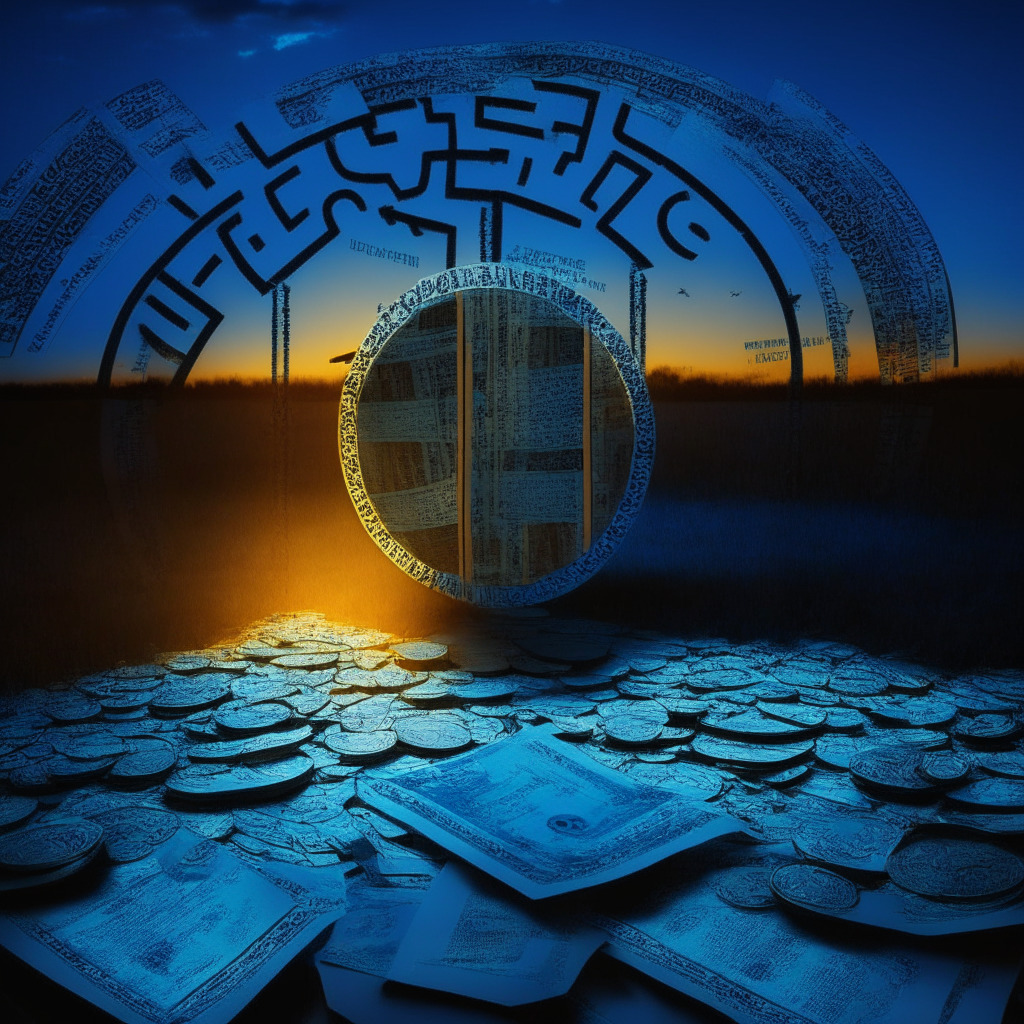Bitstamp, the world’s oldest crypto exchange, is negotiating with three major European banks to enable their entry into cryptocurrency services. This represents the different regulatory approaches between the EU, with its recent progressive MiCA regulations, and the more challenging US environment. Recent restrictions by Bitstamp on specific services for US users highlight this regulatory divergence.
Search Results for: euro
Navigating New Waters: First European Film Funded by NFTs Stirs the Cinematic World
‘The Quiet Maid’, the first European feature film funded through NFT sales, represents a new era of blockchain technology in the creative industry. Despite uncertainties surrounding NFTs, this film’s funding model garners worldwide attention. The evolution of blockchain in filmmaking is yet to unfold.
European Crypto Regulation: Balancing Sustainability, Transparency and Freedom
The European Securities and Markets Authority (ESMA) has published its second consultation paper on cryptocurrency regulations, focusing on sustainable indicators for distributed ledgers, disclosure of insider information, technicalities within white papers, transparency measures and record-keeping for Crypto asset service providers. ESMA’s move aims to encourage a more sustainable, transparent, and accountable crypto-market.
US vs Europe: CoinShares Stakes its Claim on American Cryptocurrency Regulation Prospects
European cryptocurrency investment firm CoinShares disputes the notion that the U.S. lags in cryptocurrency adoption and regulation. CoinShares argues that due to U.S regulators evaluating digital assets similarly to traditional asset classes, the U.S. is a leader in digital asset development. The company also references the integration of emerging and traditional financial players as evidence of this.
European Commission’s Effort to Mitigate Cryptocurrency’s Environmental Impact: A Balanced Digital Future?
The European Commission has secured an 800,000 euro contract to develop methodology and sustainability standards that alleviate environmental hazards associated with cryptos. This move stems from concerns over how crypto transactions and mining may negatively affect the environment, economy, and society.
Europe’s Rising Role in Driving Institutional Cryptocurrency Adoption: A Regulatory Perspective
The recent Blockchain Expo in Amsterdam highlighted Europe as the key driver for institutional cryptocurrency adoption due to its favorable regulatory climate. The European Union’s Markets in Crypto-Assets (MiCA) regulation is implicated as a safety net, offering a regulatory framework for the emerging sector and ensuring user protection, which are lacking in countries like the United States.
Binance vs. Paysafe: The Euro Conversion Crunch and Its Implications for Crypto Users
Binance, facing debanking difficulties, has urged its European users to convert Euros to Tether (USDT) due to unilateral action by banking partner, Paysafe. The latter halted processing EUR deposits for Binance users, requiring the alternative stablecoin transformation to maintain liquidity while seeking new banking solutions. This reflects the strategic challenges crypto exchanges face amidst tightening regulatory landscapes.
Binance’s Euro Crisis: The Impact of Regulatory Scrutiny on Crypto Exchanges Future
Binance, the largest crypto exchange, is facing regulatory challenges in Europe, especially in France, after its partnership with digital payment services provider, Paysafe, expired. With no banking partner, Binance France advised users to convert any fiat money they hold into crypto while the company seeks a new partnership. This situation highlights the need for crypto exchanges to comply with financial regulations to avoid service disruptions and maintain user trust.
Shifting Sands: How Stringent Crypto Regulations Impact the Future of Exchange Platforms in Europe
“Crypto exchange Gemini discontinues its services in the Netherlands due to stringent regulations instituted by the Dutch central bank. Gemini intends to comply with the Markets in Crypto-Assets Regulation (MiCa), before reopening for Dutch users. These regulatory tightening trends raise questions about the future of crypto platforms in the European Union.”
Kraken’s Expansion in Europe: Spearheading the Crypto Revolution with Key Regulatory Approvals
Crypto exchange Kraken has secured regulatory approvals in Spain and Ireland, furthering its expansion plans in Europe. With a Virtual Asset Service Provider license and an EU e-money license, Kraken will provide digital asset exchange and custodial wallet services.Investment into regulatory framework positions Europe as a promising arena for crypto growth.
Unveiling France’s AI Ambitions: Iliad’s $106m Investment and the Future of European AI
French telecom firm Iliad is investing around $106 million USD in the local artificial intelligence (AI) sector, creating a laboratory for cutting-edge AI research in Paris. The lab will design general AI while possibly making use of Europe’s ‘most powerful cloud-native Ai supercomputer’ created by NVIDIA.
Navigating the Pros and Cons of a Prospective ‘Digital Euro’
The European Central Bank (ECB) discusses its ongoing development of a Central Bank Digital Currency (CBDC) – a digital Euro. The CBDC aims to offer a user-friendly, cost-free alternative to physical cash. Privacy protection, while preventing illegal activities, is emphasized as a fundamental aspect. However, potential creation and acceptance issues raise concerns, and the decision to move forward wouldn’t be decided until later in October.
Coinbase’s Unpursued Acquisition of FTX Europe: The Impact on Crypto Derivatives Trading
Coinbase reportedly aimed to acquire bankrupt FTX Europe to expand its overseas derivatives business but ultimately pulled out. The sale of FTX Europe illustrates the high stakes in the crypto sphere, and the growth and risks associated with derivatives trading.
Navigating the Storm: EU’s MiCA and the Future of Stablecoins in Europe
“The European Union’s upcoming Markets in Crypto Assets (MiCA) regulation has raised concerns about the potential delisting of all stablecoins in Europe by June 30. MiCA aims to streamline processes and enhance oversight. However, its provisions concerning stablecoins are causing apprehension, especially as they seem to contradict the aspirations of many issuers for decentralization.”
Investigating OpenAI: Balancing Technological Innovation and European Data Privacy Laws
Poland’s data protection watchdog is investigating OpenAI’s ChatGPT following a complaint accusing the firm of “unlawful, unreliable” data handling. The case surfaces significant matters about personal data protection and OpenAI’s compliance with GDPR, reflecting a broader concern about maintaining a balance between technological innovation and privacy.
Galaxy Digital’s European Expansion: Pros, Cons and the Main Conflict Amid Regulatory Differences
Digital asset services firm, Galaxy Digital has appointed Leon Marshall as its inaugural European Chief Executive, signaling a stride towards global expansion. This venture showcases the firm’s determination to extend its territory despite challenging market trends, spurred by advancements in European digital asset regulation – a factor that’s presenting Europe as a promising crypto hub.
Binance’s Plan to Delist Stablecoins in Europe: A Critical Look at Regulatory Compliance and Market Impact
“Binance, a key cryptocurrency exchange, plans to delist all stablecoins for the European market by June 2024, in adherence to the Markets in Crypto Assets (MiCA) law. This move, expected to impact significantly on Europe’s market, reflects the potential disruptions regulatory changes can cause. Meanwhile, the U.S. resists implementing a Central Bank Digital Currency (CBDC), despite other countries’ pursuits of national digital currency.”
Balancing Act: Europe’s AI Ambition, Between Technological Advancement and Ethical Governance
President Ursula von der Leyen’s recent State of the Union address spotlighted EU’s resolve in enhancing AI technology. Within this endeavor, she proposed a “new global framework for AI”, comprising of guardrails, governance, and guiding innovation. The initiative aims at promoting responsible AI development and includes a project to expedite European supercomputer access for AI startups. Despite optimism, challenges of balancing rapid technological advancement and ethical considerations loom large.
European Digital Euro: An Unhurried Approach to Future Financial Stability
Mairead McGuinness, European Commissioner for Financial Stability emphasizes cautious approach to digital euro implementation. As cash loses popularity and commerce digitalizes, a future with digital central bank public money is anticipated. The transition could massively impact cross-border payments and global financial sectors, hence the need for careful scrutiny.
Debating the Pace of Euro’s Digitization: A Tactical Strike or Slow Rollout?
The EU financial services chief, Mairead McGuinness, emphasizes a cautious approach to the digitization of the euro, advocating strategic decision-making post the 2024 EU elections. Amid declining cash usage and rising e-commerce, the need for a digital currency alternative is expressed. Nevertheless, the transition could necessitate compromises some might resist, thereby requiring careful planning to not disrupt our financial foundations.
Unveiling the Digital Euro: Europe’s Step Towards CBDCs and What It Means For You
ECB executive Fabio Panetta recently detailed the European Commission’s plans for a digital Euro, asserting this could establish Europe as a leader in central bank digital currencies (CBDCs). The mission focuses on safeguarding European monetary sovereignty, preserving fiscal freedom, and ensuring privacy and data security. However, concerns remain over the compatibility of a digital Euro with existing financial structures.
Euro Digital Currency: Savior or Stumbling Block? A Review of the Potential Pitfalls and Progress
The digital euro by the European Union could face obstacles in non-euro states due to necessary international agreements between the EU and third-countries. Complex issues surrounding Central Bank Digital Currency (CBDC) usage, like unresolved legal queries concerning usage and jurisdiction, may hinder its implementation.
The European Digital Euro: Monetary Sovereignty Amidst Rising Private Sector Dominance
“The digital euro, a central bank digital currency (CBDC) proposed by the European Commission, is seen as a new paradigm for preserving monetary sovereignty. It would ensure Europeans maintain access to a public payment option, countering the dominance by private payment services’ standalone solutions. However, its implementation requires a balance between fostering innovation and preserving economic stability.”
IBM’s Insights on a Successful Digital Euro Implementation: A Comprehensive Approach
“IBM Consulting offers insights on the successful implementation of a digital euro, emphasizing simplicity for initial adoption, integrating payment intermediaries’ needs, standardizing APIs for seamless integration, and valuing blockchain’s significant benefits. Resilience, transparency, security, and regulatory clarity are the key concerns for an increasingly digital economy.”
Embracing the Un-chartered: The Digital Euro and its Road to Acceptance
Stefan Berger, architect of the EU’s Markets in Crypto Assets regulation (MiCA), is leading legislation for a digital euro. Despite controversy and skepticism among colleagues, Berger believes that the transition to digital currencies like the Central Bank Digital Currency (CBDC) could usher in autonomy and innovation. However, the success of this transition hinges on public trust. The EU remains undecided about the formal issue of the CBDC, with the proposal’s outcome influenced by political environment and law amendments.
Green Shift or Market Misstep? Europe’s First Article 8 Bitcoin ETF Challenges and Opportunities
The European first-of-its-kind Bitcoin ETF dubs itself as ‘environmental investing’, following the European Union’s environmental, social and governance investing standards. However, critics express scepticism regarding the sustainability of this model due to Bitcoin’s massive energy consumption. These contrasting stories capture the dynamism of the crypto market.
Regulatory Tightrope in Crypto: Worldcoin’s Controversial Practices VS Digital Euro’s Promise
“The Worldcoin project, known for its retinal scans to differentiate humans from bots, is under scrutiny for potential violations of regulations, including data privacy and security threats. This situation highlights the necessity for balanced regulatory adherence as the crypto-space evolves, emphasizing consumer protection. On a separate note, the introduction of the digital euro could harmoniously coexist with private payment solutions, addressing cross-border payment issues and increasing accessibility.”
Digital Euro and Private Payment Services: A Path to FinTech Revolution or Pitfall?
“Margarita Delgado, the deputy governor of the Spanish central bank, addressed the potential of the digital euro in enhancing cross-border payments, reducing business costs, and filling the absence of private payment service providers (PSPs) in Europe. She believes there can be a co-existence of the digital euro and private payment solutions, creating new opportunities for financial services by the private sector.”
European Legislation on Cryptocurrency: A Leap Forward or Bank Lobby Win?
“The European Parliament has passed a bill allowing banks to hold up to two percent of their capital in cryptocurrencies from January 2025, signaling evolution in global cryptocurrency regulation. However, Stefan Rust, ex-CEO of Bitcoin.com, views the bill as favoring financial institutions more than common investors.”
Binance’s SEPA Confusion: Miscommunication, Impact and Future Prospects in Europe
“Binance recently miscommunicated about the availability of euro transactions causing significant confusion. Amid troubled relations with regulatory bodies across Europe, such errors could impact Binance’s image and potential partnerships. CEO, Changpeng Zhao, urges users to ignore panic-inducing fears while awaiting transparent answers about Binance’s operations.”
Europe Pioneers Bitcoin ETF as US and UK Crypto Norms Fluctuate: A Regulatory Round Up
Europe recently approved the launch of the first spot Bitcoin ETF, fueling discussions about U.S. regulatory ambiguity. This move is significant given the SEC’s continued hesitance in endorsing a spot crypto ETF, raising concerns about regulatory transparency in U.S. cryptocurrency markets. Meanwhile, predictions suggest Bitcoin’s price breaching the $100,000 mark, even as debates about market outcomes continue.
European Premier: The Launch of Bitcoin ETF and What It Means for Global Finance
Jacobi Asset Management has launched Europe’s first Bitcoin exchange traded fund (ETF), listed on EuroNext Amsterdam Exchange. The product aims to drive Bitcoin adoption among institutional investors, levying a 1.5% annual management fee. The ETF also represents a move from Europe’s prevalent Exchange Traded Notes (ETNs), while committing to minimizing Bitcoin’s carbon footprint.































